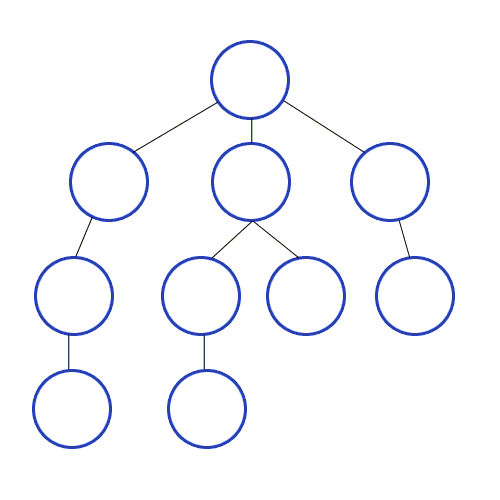
Today's challenge tackles Day 10's puzzle, a 2D grid similar to Day 6, but requiring exploration of multiple paths. This puzzle elegantly showcases the power of depth-first search (DFS).

An AI-generated illustration of the puzzle
The map is represented as a dictionary; keys are (x, y) coordinates, and values are single-digit integers (0-9) indicating height, with 9 representing the peak. The parsing function efficiently handles this data structure:
def parse(input: str) -> dict[tuple[int, int], int | None]:
return {
(x, y): int(item) if item.isdigit() else None
for y, row in enumerate(input.strip().splitlines())
for x, item in enumerate(row)
}Trails ascend from trailheads (height 0) to the peak (height 9), increasing height by exactly 1 per step. The next_step function identifies valid next steps:
TRAIL_MAX = 9
def next_step(
topo_map: dict[tuple[int, int], int | None], x: int, y: int
) -> tuple[tuple[int, int], ...]:
assert topo_map[(x, y)] != TRAIL_MAX
return tuple(
incoming
for incoming in (
(x + 1, y),
(x, y + 1),
(x - 1, y),
(x, y - 1),
)
if (
isinstance(topo_map.get(incoming), int)
and isinstance(topo_map.get((x, y)), int)
and (topo_map[incoming] - topo_map[(x, y)] == 1)
)
)Trailheads (height 0) are located using find_trailheads:
TRAILHEAD = 0
def find_trailheads(
topo_map: dict[tuple[int, int], int | None],
) -> tuple[tuple[int, int], ...]:
return tuple(key for key, value in topo_map.items() if value == TRAILHEAD)The core of the solution is the climb function, which implements a depth-first search. Following Wikipedia's definition of DFS, we explore each branch fully before backtracking.

A visual representation of depth-first search
Map points are our "nodes," and we ascend one height level at a time. The climb function manages the DFS process:
def climb(
topo_map: dict[tuple[int, int], int | None], trailheads: tuple[tuple[int, int], ...]
) -> dict[
tuple[tuple[int, int], tuple[int, int]], tuple[tuple[tuple[int, int], ...], ...]
]:
candidates: list[tuple[tuple[int, int], ...]] = [(head,) for head in trailheads]
result = {}
while candidates:
current = candidates.pop()
while True:
if topo_map[current[-1]] == TRAIL_MAX:
result[(current[0], current[-1])] = result.get(
(current[0], current[-1]), ()
) + (current,)
break
elif steps := next_step(topo_map, *current[-1]):
incoming, *rest = steps
candidates.extend([current + (step,) for step in rest])
current = current + (incoming,)
else:
break
return resultThe else clause's break handles dead ends, preventing infinite loops. The function returns all paths from each trailhead to the peak.
Part 1 counts the unique peak destinations:
def part1(input: str) -> int:
topo_map = parse(input)
return len(climb(topo_map, find_trailheads(topo_map)))Part 2 counts all unique paths:
def part2(input: str) -> int:
topo_map = parse(input)
return sum(
len(routes) for routes in climb(topo_map, find_trailheads(topo_map)).values()
)While alternative approaches exist (e.g., integrating trailhead detection into parsing), this solution's performance is acceptable. Recent job search setbacks haven't dampened my spirits; I remain hopeful. If you're seeking a mid-senior Python developer, please reach out. Until next week!
The above is the detailed content of Climbing a depth-first search hill, Advent of Code day 10. For more information, please follow other related articles on the PHP Chinese website!
 How to export excel files from Kingsoft Documents
How to export excel files from Kingsoft Documents
 laptop power
laptop power
 How to solve the problem that js code cannot run after formatting
How to solve the problem that js code cannot run after formatting
 The difference between git and svn
The difference between git and svn
 Is it necessary to upgrade windows 11?
Is it necessary to upgrade windows 11?
 The difference between Sass and less
The difference between Sass and less
 How to connect html files and css files
How to connect html files and css files
 Introduction to online calculator software
Introduction to online calculator software
 The difference between vscode and vs
The difference between vscode and vs




